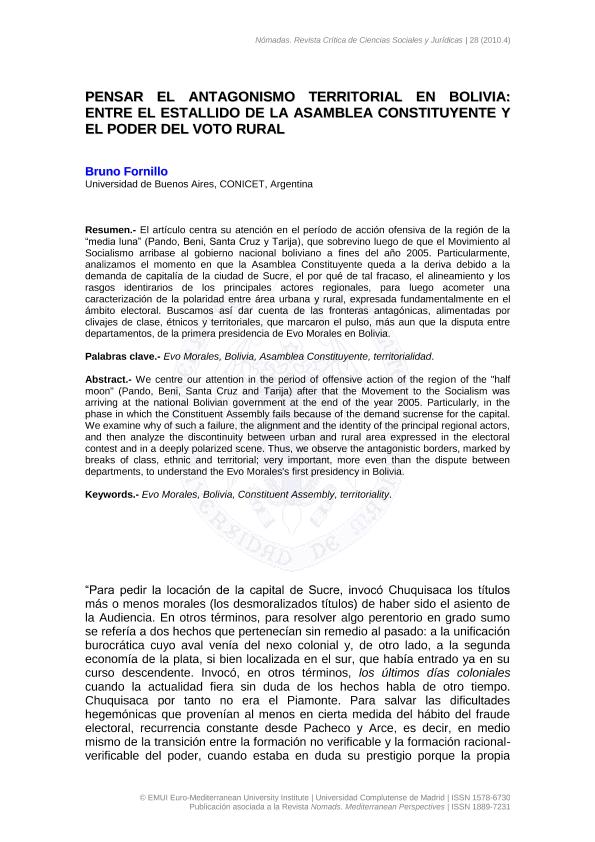Mostrar el registro sencillo del ítem
dc.contributor.author
Fornillo, Bruno Martín

dc.date.available
2023-03-14T11:06:13Z
dc.date.issued
2010-10
dc.identifier.citation
Fornillo, Bruno Martín; Pensar el antagonismo territorial en Bolivia: Entre el estallido de la Asamblea Constituyente y el poder del voto rural; Universidad Complutense de Madrid; Nómadas; 4; 28; 10-2010; 347-364
dc.identifier.issn
1578-6730
dc.identifier.uri
http://hdl.handle.net/11336/190420
dc.description.abstract
El artículo centra su atención en el período de acción ofensiva de la región de la “media luna” (Pando, Beni, Santa Cruz y Tarija), que sobrevino luego de que el Movimiento al Socialismo arribase al gobierno nacional boliviano a fines del año 2005. Particularmente, analizamos el momento en que la Asamblea Constituyente queda a la deriva debido a la demanda de capitalía de la ciudad de Sucre, el por qué de tal fracaso, el alineamiento y los rasgos identirarios de los principales actores regionales, para luego acometer una caracterización de la polaridad entre área urbana y rural, expresada fundamentalmente en el ámbito electoral. Buscamos así dar cuenta de las fronteras antagónicas, alimentadas por clivajes de clase, étnicos y territoriales, que marcaron el pulso, más aun que la disputa entre departamentos, de la primera presidencia de Evo Morales en Bolivia.
dc.description.abstract
- We centre our attention in the period of offensive action of the region of the "half moon" (Pando, Beni, Santa Cruz and Tarija) after that the Movement to the Socialism was arriving at the national Bolivian government at the end of the year 2005. Particularly, in the phase in which the Constituent Assembly fails because of the demand sucrense for the capital. We examine why of such a failure, the alignment and the identity of the principal regional actors, and then analyze the discontinuity between urban and rural area expressed in the electoral contest and in a deeply polarized scene. Thus, we observe the antagonistic borders, marked by breaks of class, ethnic and territorial; very important, more even than the dispute between departments, to understand the Evo Morales's first presidency in Bolivia.
dc.format
application/pdf
dc.language.iso
spa
dc.publisher
Universidad Complutense de Madrid

dc.rights
info:eu-repo/semantics/openAccess
dc.rights.uri
https://creativecommons.org/licenses/by-nc-sa/2.5/ar/
dc.subject
Evo Morales
dc.subject
Bolivia
dc.subject
Asamblea Constituyente
dc.subject
Territorialidad
dc.subject.classification
Otras Sociología

dc.subject.classification
Sociología

dc.subject.classification
CIENCIAS SOCIALES

dc.title
Pensar el antagonismo territorial en Bolivia: Entre el estallido de la Asamblea Constituyente y el poder del voto rural
dc.type
info:eu-repo/semantics/article
dc.type
info:ar-repo/semantics/artículo
dc.type
info:eu-repo/semantics/publishedVersion
dc.date.updated
2023-03-12T15:46:52Z
dc.journal.volume
4
dc.journal.number
28
dc.journal.pagination
347-364
dc.journal.pais
España

dc.journal.ciudad
Madrid
dc.description.fil
Fil: Fornillo, Bruno Martín. Universidad de Buenos Aires; Argentina. Consejo Nacional de Investigaciones Científicas y Técnicas; Argentina
dc.journal.title
Nómadas

dc.relation.alternativeid
info:eu-repo/semantics/altIdentifier/url/https://dialnet.unirioja.es/servlet/articulo?codigo=4732075
Archivos asociados
